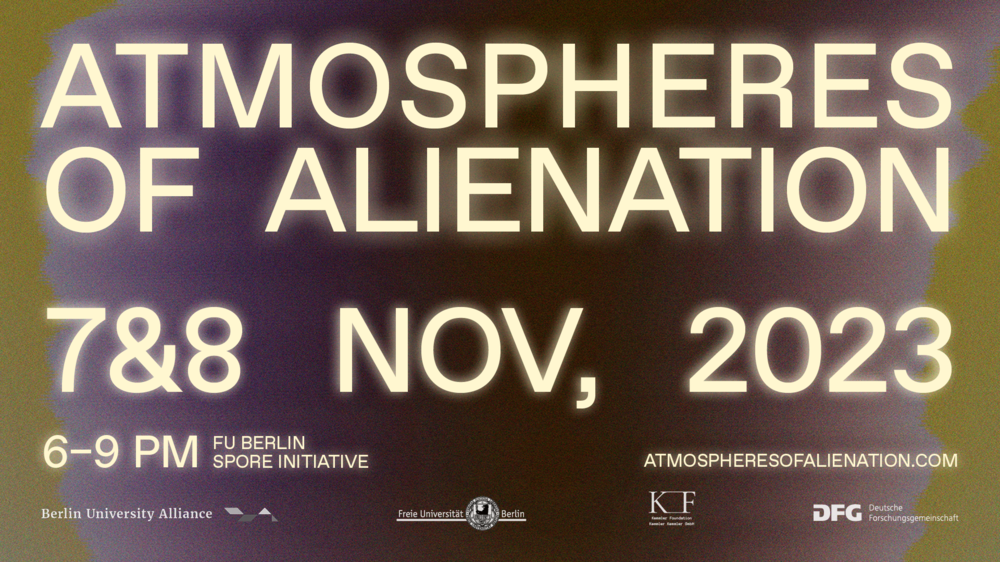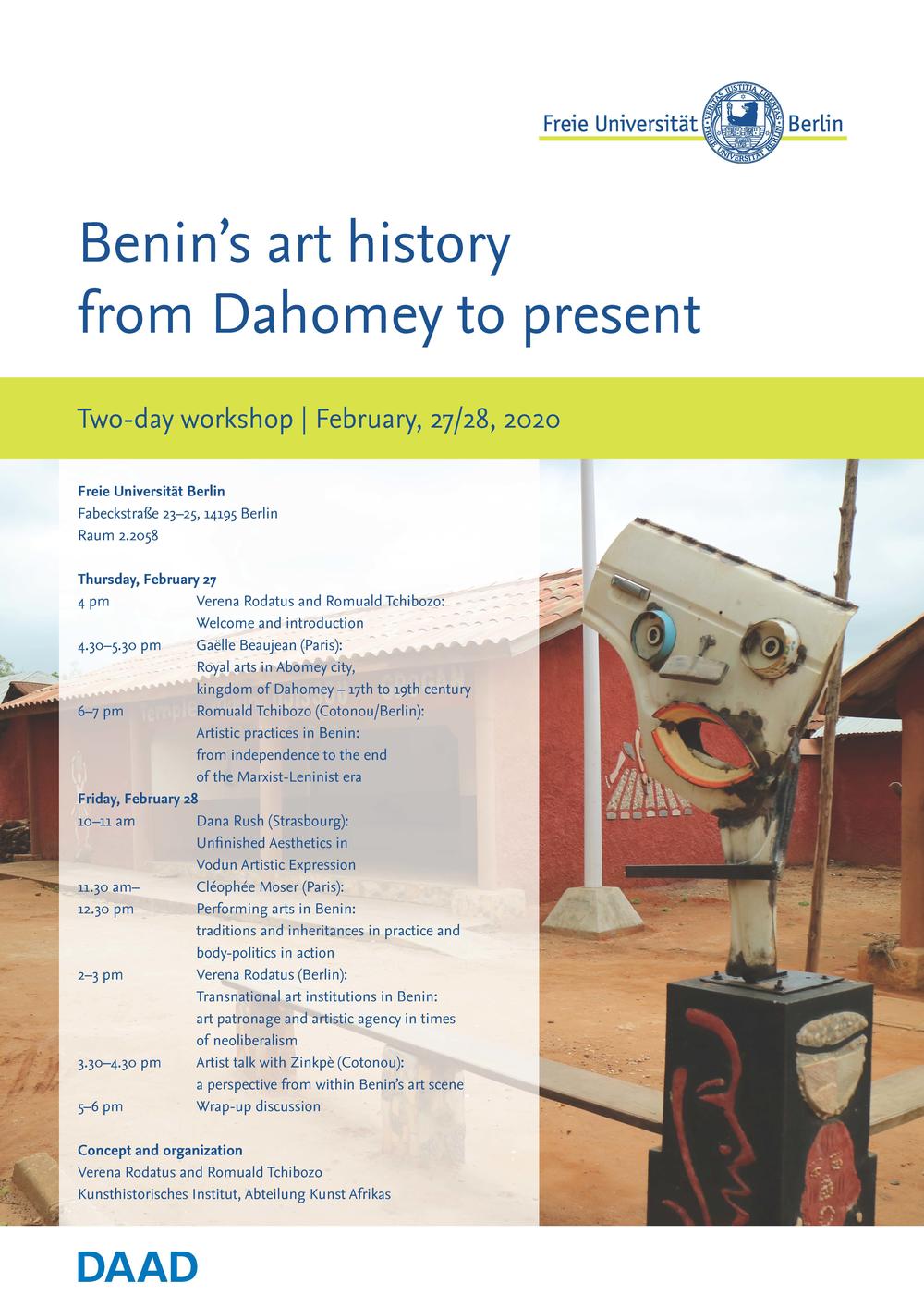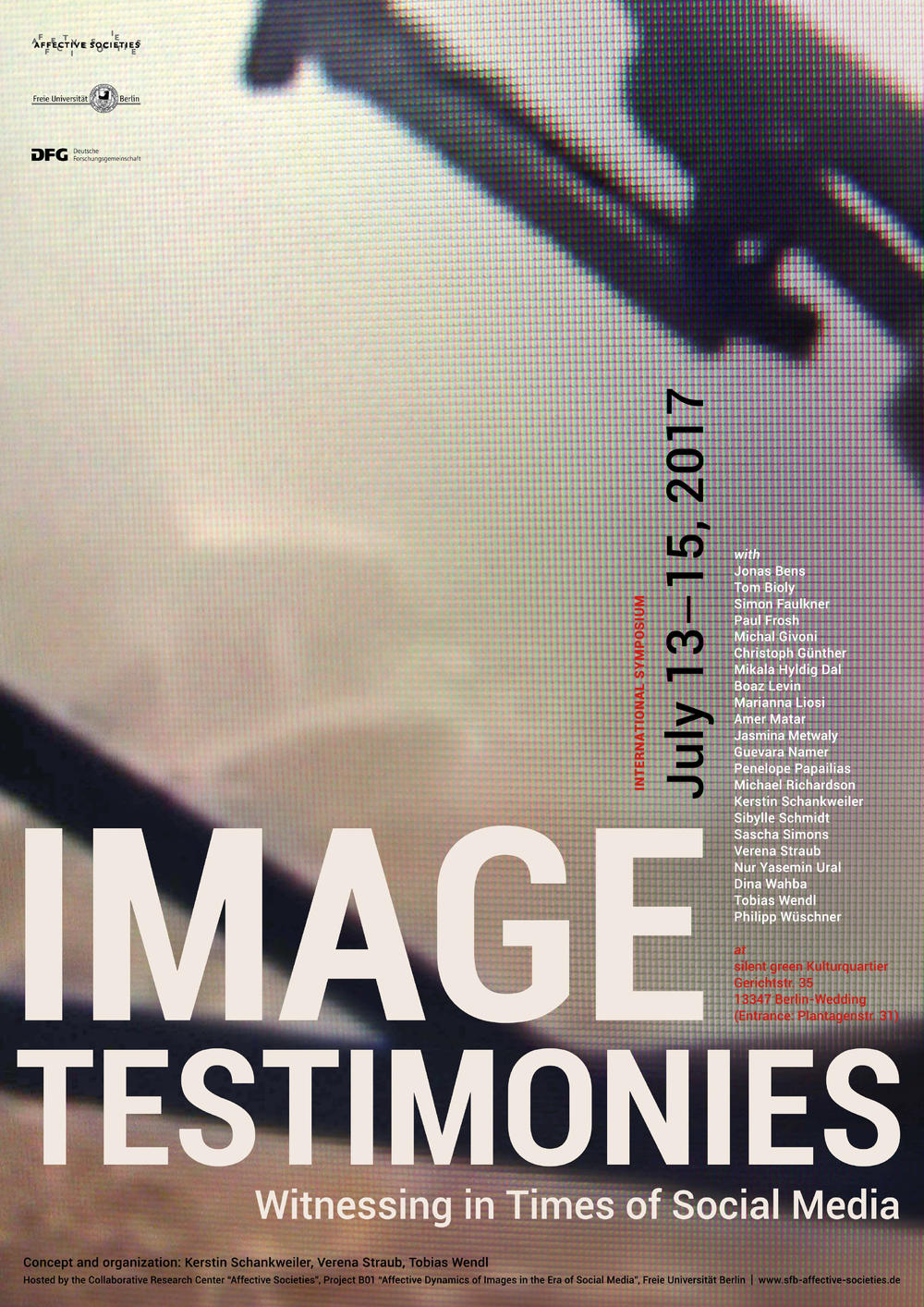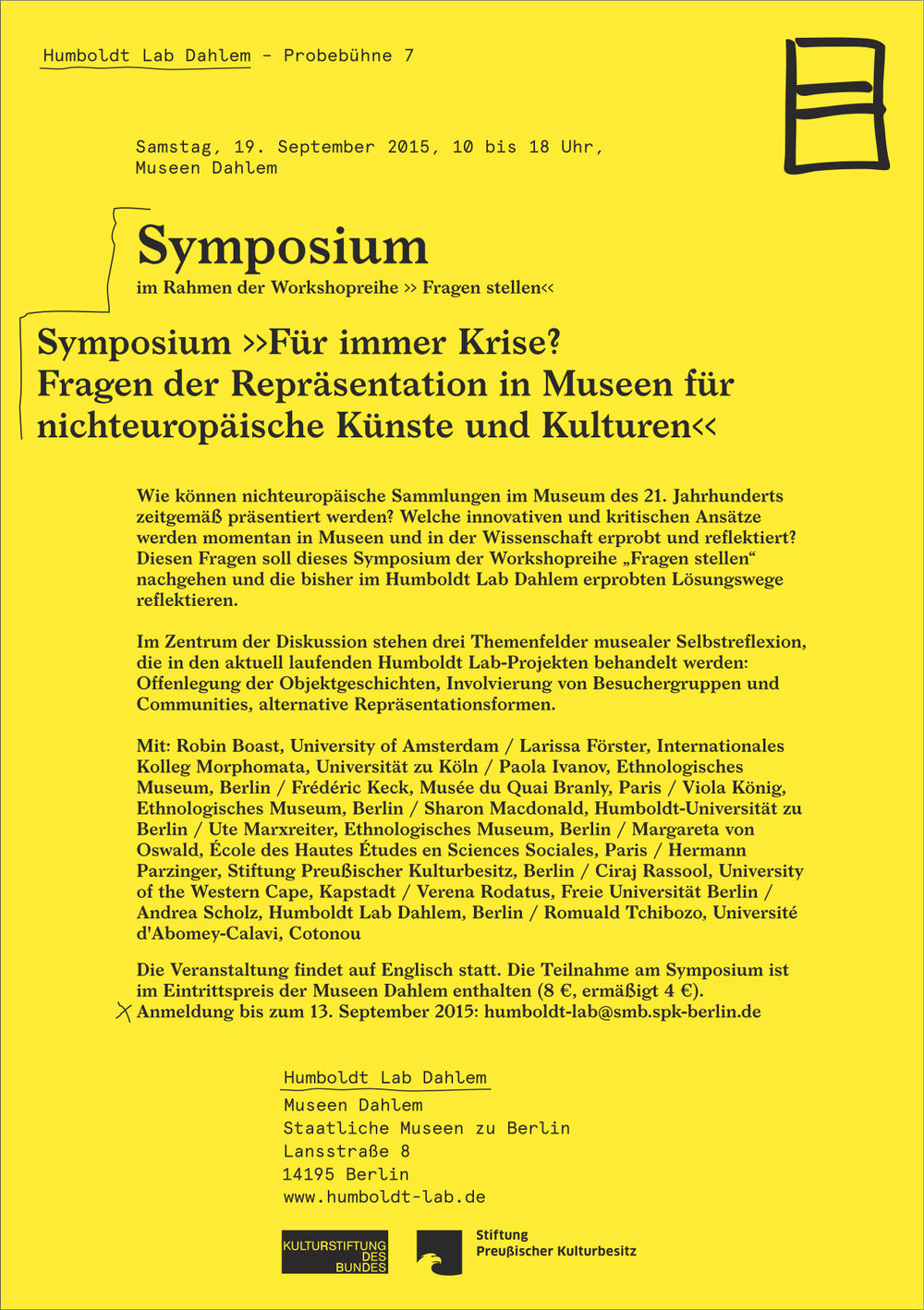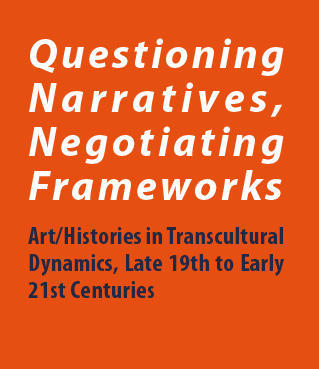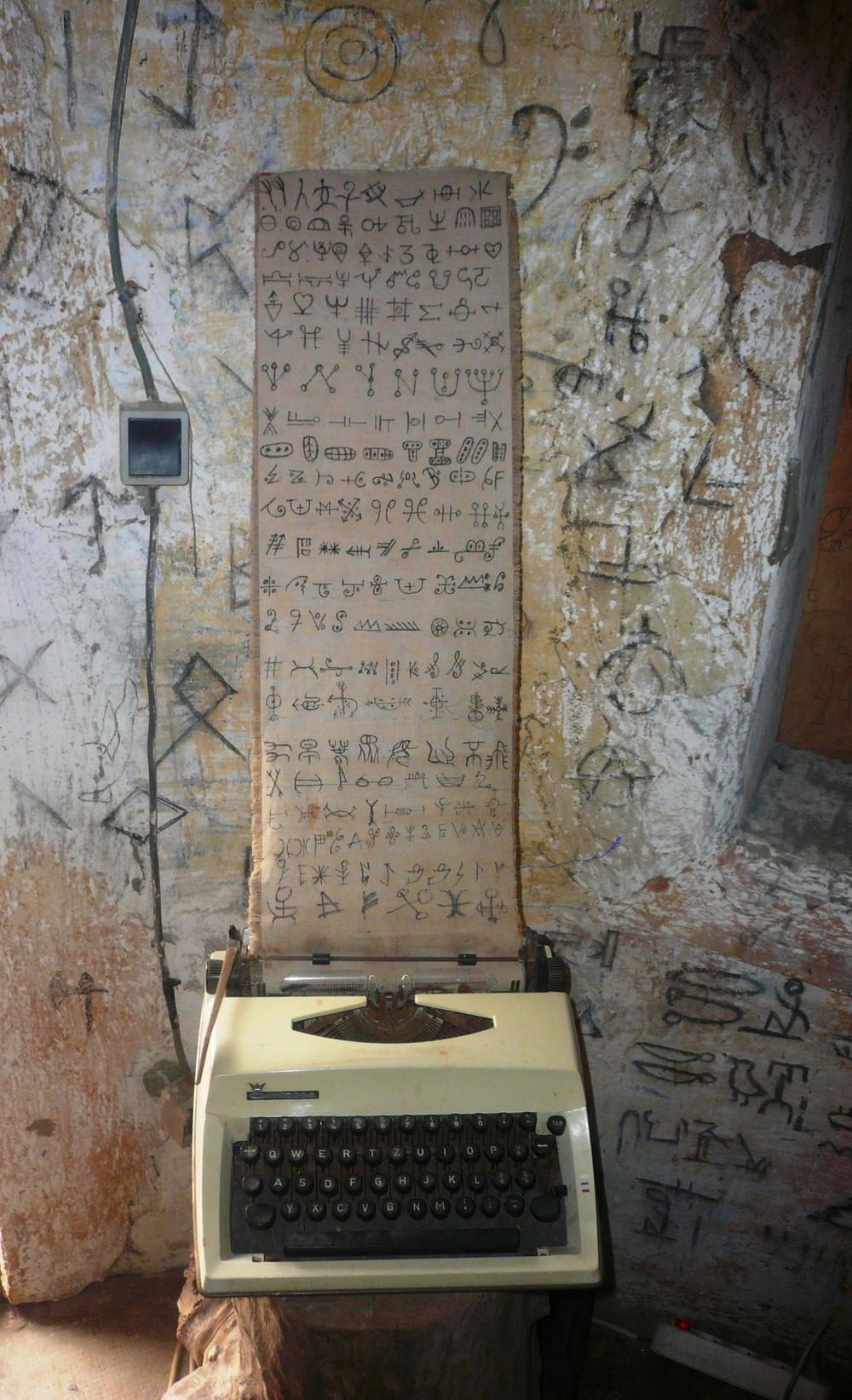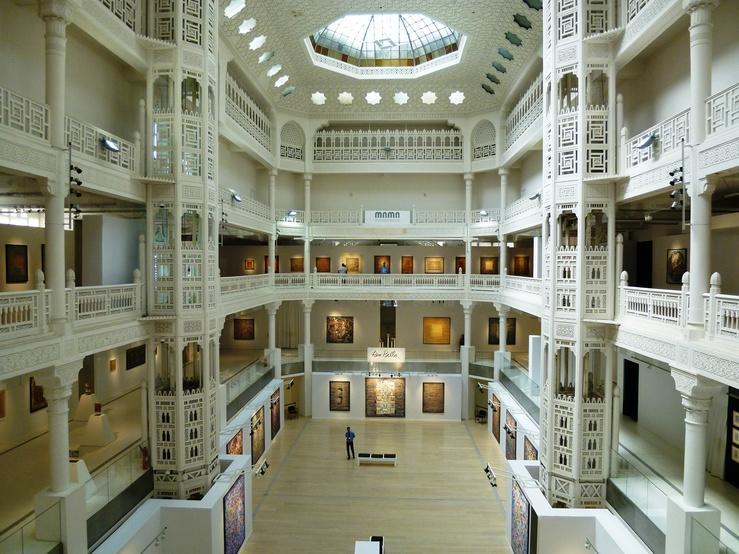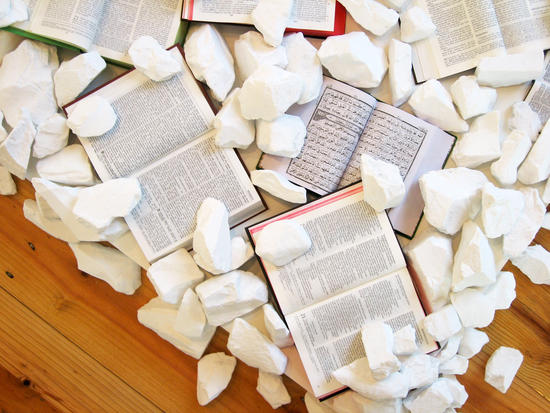Workshops und Tagungen
Hier finden Sie weiterführende Informationen zu Workshops und Tagungen.
Atmospheres of Alienation, 7.-9. November 2023
Two-day symposium convened by Daniel Horn (Institute of Art History, FU Berlin) and Onyeka Igwe (Ruskin School of Art, University of Oxford) at Kunsthistorisches Institut FU Berlin und Spore Initiative
“Atmospheres of Alienation” gathers recent work that retrace and review the image-making and theorisations pursued by artistic practitioners in Africa, Europe, the United States, and the Caribbean throughout the late colonial twentieth century. Likewise we gather insights from cross-disciplinary research including cinema studies, urbanism and cybernetics that thematise alienation, which extend to recent arguments about new materialisms and the variously extractive technologies of social engineering. Two panels presenting on Antecedents and Revisions and Currents and Climates explore, take stock of and share the atmospheres of alienation, their aftere$ects and their contemporary visions.
Programm
Nov 7
Panel I: "Antecedents and Revisions"
FU Institute of Art History-Hörsaal B, Koserstrasse 20, 14195 Berlin
6-8pm
Speakers:
Maryam Ohadi-Hamadani, University of Edinburgh
"Visualising 'The Inner Plantation'". The Caribbean Artists Movement and London of the 1960s"
Aline Pighin, CESSMA Paris
"Poto-Poto at the Galerie Palmes. Narratives from Black Paris, 1952"
Rufus Nwoko, New Culture Studio, Ibadan
"Je ka lo siwaju. Revisiting the Ibadan Mbari story"
Nydia A. Swaby, ICA London
"Amy & Me in the Archive: Auto/ethnography as Black Feminist Archival Practice"
Nov 8
Panel II: "Currents and Climates"
Spore Initiative, Hermannstrasse 86, 12051 Berlin
7-9pm
Speakers:
KJ Abudu, Swiss Institute New York
"Traces of Ecstasy. Decolonial Spectropoetics at the Lagos Biennial 2024"
Annabelle Aventurin, Ciné-Archives, Paris
"Anti-Colonial Cinema, Communism and the Med Hondo Archive"
Tobi Haslett, Yale University
"Watts Reconsidered. From Guy Debord to James Boggs"
Seb Franklin, King’s College London
“‘Atmospheres of Improvement'. Productions of Race in Capital Accumulation”
November 9
Screening: “Non-Aligned Film Archives: You Can’t Live with Other People’s Memories” curated by Annabelle Aventurin, Ciné-Archives Paris
Location: Sinema Transtopia, Lindower Str. 20/22, Haus C, 13347 Berlin
Internationaler Workshop: "Benin’s Art History from Dahomey to Present". Freie Universität Berlin, 27. - 28. Februar 2020
Freie Universität, Fabeckstraße 23–25, 14195 Berlin, Raum 2.2058
The workshop aims at elaborating the contours of an art history of Benin that takes into account the (art-) historical processes of the precolonial kingdom Dahomey as well as the trans-regional entanglements of the postcolonial state. It will bring together in-depth case studies of different (art) historical periods - reflecting historical, modern and contemporary art in relation to the visual culture of Benin: In a first part, we will discuss art production under mainly (royal and governmental) patronage - as in the kingdom of Dahomey in the precolonial as colonial era (17th-19th century), in times of post-independence (1960-1974), in Benin’s socialist era (1974-1990) and in the state-organized Vodun-Festivals in the context of the country’s democratization (early 1990s). In a second part, we will reflect on more recent independent artist initiatives and their art production (mid-1990ies) as well as on contemporary art in new transnational networks (biennials, independent art spaces) in the era of neoliberalism (since 2000).
Thursday, February 27, 2020
4 pm Verena Rodatus and Romuald Tchibozo: Welcome and introduction
4.30–5.30 pm Gaëlle Beaujean (Paris): Royal arts in Abomey city, kingdom of Dahomey – 17th to 19th century
Coffee break
6–7 pm Romuald Tchibozo (Cotonou/Berlin): Artistic practices in Benin: from independence to the end of the Marxist-Leninist era
Friday, February 28, 2020
10–11 am Dana Rush (Strasbourg): Unfinished Aesthetics in Vodun Artistic Expression
Coffee break
11.30 am–12.30 pm Cléophée Moser (Paris): Performing arts in Benin: traditions and inheritances in practice and body-politics in action
Lunch
2–3 pm Verena Rodatus (Berlin): Transnational art institutions in Benin: art patronage and artistic agency in times of neoliberalism
Coffee break
3.30–4.30 pm Artist talk with Zinkpè (Cotonou): a perspective from within Benin’s art scene
5–6 pm Wrap-up discussion
Concept and organization:
Verena Rodatus and Romuald Tchibozo
Kunsthistorisches Institut Abteilung Kunst Afrikas
Symposium: "Image Testimonies. Witnessing in Times of Social Media". Silent Green Kulturquartier, 13. - 15. Juli 2017
Recent political conflicts signal an increased proliferation of image testimonies shared widely via Social Media. Although witnessing with and through images is not a phenomenon of the internet era, image practices and politics in Social Media as much as new technology have enabled individuals to record, upload, and share images directly via mobile devices, which makes nearly everyone a potential witness. In relation to their ability to give and to create evidence, the special efficacy of image testimonies seems to lie in their ability to affect, to move, or to mobilize. Witnessing, especially when unfolding in Social Media, needs to be defined as a collective and relational practice with the effect of forming communities, and provoking further image testimonies. What exactly is being testified by these various forms of witnessing can only be studied from multiple perspectives and necessitates complicating the “truth-claims” that are made.
Against this backdrop the symposium seeks to contribute to the ongoing debate on the topic of testimony and witnessing. Which different concepts of witnessing are at stake in image testimonies? What is the role of the spectator? How can we think of the relation between mediated forms of witnessing and the body? A guiding theme of the symposium is these images’ affective dynamics in order to shape a new approach on testimony theory.
Conception and Organization:
Kerstin Schankweiler, Verena Straub, Tobias Wendl
Free University Berlin
CRC 1171 Affective Societies
Project B01 “Affective Dynamics of Images in the Era of Social Media”
Habelschwerdter Allee 45
D-14195 Berlin
Phone: 0049 (0)30 838 55214
Contact: kerstin.schankweiler@fu-berlin.de and verena.straub@fu-berlin.de
Time & Place
13.-15. Juli 2017
silent green Kulturquartier
Gerichtstraße 35
13347 Berlin-Wedding
Link: www.sfb-affective-societies.de/teilprojekte/B/B01/Symposium/index.html
Symposium: "Für immer Krise? Fragen der Repräsentation in Museen für nicht-europäische Künste und Kulturen". Staaliche Museen Berlin 19. September 2015
In Museen für nichteuropäische Künste und Kulturen gewinnen die Problematiken der Repräsentation umso mehr an Virulenz, als ihre Sammlungen im Wesentlichen aus der Hochzeit von Imperialismus und Kolonialismus stammen. Damit stehen sie nicht nur mit asymmetrischen Machtverhältnissen und teils gewaltsamen Aneignungen in Verbindung; vielmehr perpetuiert bereits die institutionelle Sammlungsordnung auf fatale Weise die koloniale Konstruktion der „nicht-modernen Anderen“ und die ihr zugrundeliegenden Wissensordnungen.
Vor dem Hintergrund der hier skizzierten Problematiken wollen wir die bisher erprobten Lösungswege reflektieren und die Frage nach einer zeitgemäßen Präsentation nichteuropäischer Sammlungen im Museum des 21. Jahrhunderts stellen. Dabei wollen wir einen besonderen Fokus auf das Potenzial des Ausstellens von Sammlungen nichteuropäischer Künste und Kulturen richten: nicht nur in Hinblick auf die Auseinandersetzung mit der Vergangenheit, sondern auch hinsichtlich der gesellschaftlichen Entwicklungen der Gegenwart – der Tatsache also, dass in der heutigen globalisierten Welt die konstruierten „Anderen“ Teil unserer Gesellschaft und des musealen Publikums geworden sind.
Ziel des Symposiums ist es, sowohl die theoretische Reflexion voranzutreiben als auch mögliche zukünftige Herangehensweisen an die Sammlungen und ihre Präsentation herauszuarbeiten.
Mit:
Robin Boast, University of Amsterdam / Larissa Förster, Internationales Kolleg Morphomata, Universität zu Köln / Paola Ivanov, Ethnologisches Museum, Berlin / Frédéric Keck, Musée du Quai Branly, Paris / Viola König, Ethnologisches Museum, Berlin / Sharon Macdonald, Humboldt-Universität zu Berlin / Ute Marxreiter, Ethnologisches Museum, Berlin / Margareta von Oswald, École des Hautes Études en Sciences Sociales, Paris / Hermann Parzinger, Stiftung Preußischer Kulturbesitz, Berlin / Ciraj Rassool, University of the Western Cape, Kapstadt / Verena Rodatus, Freie Universität Berlin / Andrea Scholz, Humboldt Lab Dahlem, Berlin / Romuald Tchibozo, Université d'Abomey-Calavi, Cotonou
Tagung: "Questioning Narratives, Negotiating Frameworks. Art/Histories in Transcultural Dynamics, Late 19th to Early 21st Centuries". Berlin 05. – 07. Dezember 2013
Ausgangspunkt der Tagung sind rezente kunsthistorische Debatten, in denen der Anspruch erhoben wird, die eurozentrischen Prämissen der Disziplin grundlegend zu überdenken. Die Zunahme transkultureller Verflechtungen in der zeitgenössischen Kunst hat überdies Diskussionen über methodische Verfahrensweisen in Gang gesetzt. Das Ziel der Konferenz ist es, historische Formationen dieser Debatten in den Blick zu nehmen.
Bereits seit dem späten 19. Jahrhundert haben Künstler, Kritiker und Kunsthistoriker in Afrika, den Amerikas, Asien und Europa die unter imperialistischer Dominanz geprägten Konzepte von Kunst sowie die Definition ihrer Grenzen wiederholt zum Thema gemacht. Die schwere Krise, in die die Kunstgeschichtsschreibung nach dem Ersten Weltkrieg geriet, provozierte beispielsweise eine radikale Neuorientierung, in deren Verlauf innovative Begriffe und Methoden entwickelt und Künstler sowie Kunsthistoriker von außerhalb Europas einbezogen wurden.
Im Rahmen der Konferenz werden kunsthistorische Narrative, Kunstobjekte und Ausstellungen diskutiert, anhand derer sich historisch etablierte transkulturelle Vergleiche, Interaktionen und Transformationen aufzeigen lassen. Es werden kunstinhärente Dynamiken untersucht, die u.a. Diskurse über Identitäten sowie Konzepte wie ‚Avantgarde‘ oder ‚Moderne‘ mit ihren Schlüsselbegriffen von ‚Authentizität‘ und ‚Originalität‘ generier(t)en.
Thursday, 5 December 2013
18:00 Gregor Stemmrich (Berlin): Opening
18:30 Matthew Rampley (Birmingham): World Art Studies and the New Darwinism
(Reception)
Friday, 6 December 2013: Museen Dahlem, Großer Vortragssaal
9:30 Viola König (Ethnologisches Museum, SMB): Welcome Remarks
9:45 Gregor Stemmrich (Berlin): Introduction
10:00 Michael Asbury (London): Some Notes on the Contamination and Quarantine of Brazilian Modern Art
10:30 Paola Ivanov (Berlin): Rethinking Coevalness: Entangled History and the Objects of Ethnographic Museums
11:00 Discussion
12:00 Wibke Schrape (Berlin): From the Ogata-Lineage to the Kōrin-School: Images as Mediators of Identity in Art-Historical Narratives
12:30 Juliane Noth (Berlin): Comparing the Histories of Chinese and Western Landscape Painting: Historiography and Artistic Practice in »National Painting Monthly« (1934–35)
14:30 Georg Vasold (Berlin): Looking beyond Europe: Josef Strzygowski and the Re-Evaluation of Art History in the 1920s
15:00 Sylvester Okwunodu Ogbechie (Santa Barbara): Art, Nationalism and Modernist Histories: Writing Art History in South Africa and Nigeria
15:30 Discussion
Saturday, 7 December 2013: Museen Dahlem, Großer Vortragsaal
9:45 Tobias Wendl (Berlin): Introduction
10:00 Shigemi Inaga (Kyoto): Expressionism and Qiyun Shengdong/Kiin Seidō: Re-Evaluating the Ming-Qing Dynasties Chinese Painting in Modern Japan. Hashimoto Kansetsu and Kyoto School Sinologists 1910-1930
10:30 Isabel Wünsche (Bremen): Transgressing National Borders and Artistic Styles: The November Group and the International Avant-garde in Berlin during the Interwar Periiod
12:00 Partha Mitter (Oxford): Jamini Roy: Negotiating the Global from a Local Perspective
12:30 Melanie Klein (Berlin): Modes of Creation: Art Teaching in South Africa and Uganda between Theory and Practice
14:30 Tomoko Mamine (Berlin): Experimenting Within, Between and Beyond Frames: Gutai's Art of Experience (1950-1960s)
15:00 Pauline Bachmann (Berlin): Concrete Art and Embodiment: Artistic Strategies in Brazilian Neoconcretism between Local and Global Venues
15:30 Birgit Hopfener (Berlin): Participation is the Answer but what are the Questions? Critical Negotiations of Participatory Art Discourses in Contemporary China
Internationaler Workshop: "Fictions, Fakes and Authenticities. Perspectives from Africa and Beyond". Berlin 21. Juni 2013
Im Rahmen der Forschergruppe FOR 1703 "Transkulturelle Verhandlungsräume von Kunst." KHI Berlin.
Das Authentische, das Originelle, die Wiederholung oder das Fake sind innerhalb der ästhetischen Praxis eng miteinander verzahnte Konzepte, die sowohl die Sehnsucht nach aber auch Kritik an Fiktionen des Unverfälschten und Wahrhaftigen beschreiben. Als strategische künstlerische Entwürfe gedacht, offenbaren sie dabei eine gegenseitige Bedingtheit, die über eine strikte Distinktion hinaus geht. Die Konzepte umkreisen einander und scheinen „Wahrheit“ gleichsam fiktional vermitteln oder wieder auflösen zu können. Der Workshop befasst sich mit einer solchen Prozesshaftigkeit alles Fiktionalen und legt den Schwerpunkt auf dessen transkulturelle Dimensionen.
Programm:
13:30 Opening: Tobias Wendl - Introduction: Melanie Klein
13:45 Allan DeSouza (San Francisco): Speaking in tongues. The Signifyin’ Artist as Truthful Liar
14:45 Stefan Römer (Berlin): The Readymade as a Transcultural “Inter-esse”
15:45-16:15 Coffee Break
16:15 Melanie Klein (Berlin): Creating the Authentic. Art Teaching in South Africa as Transcultural Phenomenon
17:15 Elizabeth Morton (Crawfordsville): Disentangling Authenticities. The Mission Imagination and the Artist’s Quest for Modernity in Southern Africa
18:15 Philip Metz (Berlin): Performance
Panel: "Kunstethnologie und Kunstgeschichte. Eine Ortsbestimmung." Mainz DGV-Tagung 2.-5. Oktober 2013
Panel im Rahmen der Tagung der deutschen Gesellschaft für Völkerkunde (2.-5. Oktober 2013 in Mainz). Christiane Brosius und Kerstin Pinther in Kooperation mit Cathrine Bublatzky.
Anders als an US-amerikanischen Universitäten, spiel(t)en Fragen der Kunst innerhalb der deutschsprachigen Ethnologie nur eine marginale Rolle. Dies erstaunt umso mehr, bedenkt man nicht nur die derzeit zu beobachtende „Kreolisierung der Künste“ und den „Boom der Biennalen“, sondern auch die daraus resultierenden neuen Schnittstellen zwischen Universitäten, Museen/Ausstellungshäusern und Künstlerinitiativen. Sowohl für die Kunstethnologie, die tendenziell eher synchronische Fragestellungen verfolgte, wie auch für die Kunstgeschichte, die in ihrer diachronischen Ausrichtung primär auf die Kunst Europas und der USA fixiert war, stellen sich in diesem Kontext neue theoretische und methodische Herausforderungen.
Der Workshop widmet sich einer Bestandsaufnahme der historisch gewachsenen Kollaborationen und wechselseitigen Transfers zwischen Kunst, Kunstgeschichte und Kunstethnologie. Beiträge, die Fragen von aktueller Recherchekunst, die oft mit (quasi-) ethnographischen Methoden arbeitet, behandeln, sind dabei ebenso von Interesse wie solche, die die aktuell diskutierte neue Rolle des Kurators als Ethnographen untersuchen.
Darüber hinaus geht es uns um die Frage nach den sich abzeichnenden Synthesen und Neukonfigurationen der methodischen Zugänge im Schnittbereich der Disziplinen. Welchen Anforderungen muss eine transkulturell und zugleich historisch perspektivierte Kunstwissenschaft genügen?Dabei interessieren uns aktuelle Forschungen und Fallbeispiele über translokale Verknüpfungen im Bereich der modernen und zeitgenössi-schen Kunst, aber auch Beiträge, die Ähnlichkeiten und Differenzen zwischen künstlerischen, ethnografischen und kunsthistorischen Forschungspraktiken kritisch betrachten. Des Weiteren fragen wir, welche neuen Berufsfelder sich Kunsthistorikern und Ethnologen an Schnittstellen von Kunst und Wissenschaft eröffnen und welche Neu-)Anforderungen an die akademische Ausbildung damit verbunden sind.
Internationaler Workshop: "New Spaces for Negotiating Art (and) History in African Cities". Bamako/Mali 14.-17. März 2012
Point Sud, Centre for Research on Local Knowledge, Bamako, Mali. Kerstin Pinther and Larissa Förster.
In most African countries, cultural institutions like museums and art galleries, archives and art academies were established either by the colonial state or in the context of postcolonial nation building. Hence, the cultural field has often been shaped according to national aesthetics and/or thematic concepts and guidelines. Although many artists and activists have repeatedly criticized and distanced themselves from state-initiated cultural politics – as, for example, community archives and community art centres in Apartheid South Africa or initiatives like the “Laboratoire Agit-Art” in post-independence Senegal – from early on, it seems that particularly during the last two decades a series of new spaces and initiatives were created. They set themselves apart from municipal and/or state-affiliated institutions as well as from commercial (art) markets and created alternative models and platforms for negotiating art (and) history, reflecting upon and archiving art, visual culture and (cultural) history. Cases in point are the Contemporary Image Collective (Cairo), Doula’art (Douala), the District Six Museums (Cape Town) or Zoma Contemporary Art Centre (Addis Ababa), to name but a few. Some of these initiatives aim to establish self-organized, non-hegemonic and experimental fields and orders of knowledge, others deliberately question institutions established by the postcolonial nation state, still others attempt at filling in where public institutions are undermined.
In many cases, scholars, cultural practitioners, curators and artists as well as activists join to collaborate in these spaces. New forms of south-south-cooperation and transnational networking – including diasporic communities – are developed. This inter- and transdisciplinary workshop intends to take these independent spaces and initiatives as a starting point to discuss and analyze the expanding and diversifying field of cultural production and reflection in African cities.
We invite scholars and practitioners (founders, members and users of such spaces as well as artists and curators) to present case studies or comparative analyses with one or more of the following (research) focuses: 1) Histories against which historical backgrounds must the emergence of such spaces be read in different countries? How did they develop in different fields (art, culture, history), and in which ways are their histories connected? 2) Modi operandi: approaches, (curatorial) practices and strategies. How are these spaces organized and maintained? What curatorial practices, scientific and/or aesthetic strategies do they employ? Which media do they work with? 3) Addressing and archiving the past. How do they reflect upon history? How and to what end do they acquire and work with (historical) collections and build (historical) archives? 4) Questioning canons In what ways do such spaces comment on or even question canons of historical and art historical knowledge, e.g. established historical narratives or boundaries between art and (popular) culture etc.? Which theoretical and/or methodological debates do they draw upon or feed their work into? 5) Urban spaces and urban publics. How do these sites relate to the specific urban spaces and situations in which they have emerged? How do they engage with the broader urban public, with different audiences and groups of interested users and/or contributors? How do they affect the access and use of public space in African cities? 6) Revisiting state and municipal institutions. How do these initiatives position themselves vis-à-vis, relate to or collaborate with municipal or national institutions?
At the end of the workshop, possibilities and perspectives for a long-term cooperation between the workshop participants in the field of African Studies, Visual Culture Studies, Art History, Museum and Archive Studies will be explored. A publication of the workshop proceedings is envisaged. We particularly encourage younger scholars and practitioners to submit a short CV and an abstract of no more than 500 words by October 31, 2011. The project, which runs under the name “Programme Point Sud” of the German Research Foundation, will cover travel expenses and accommodation for all speakers.

